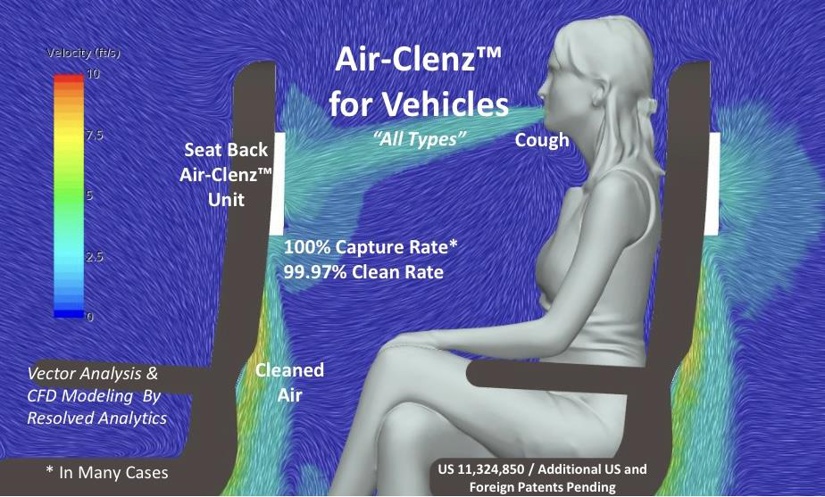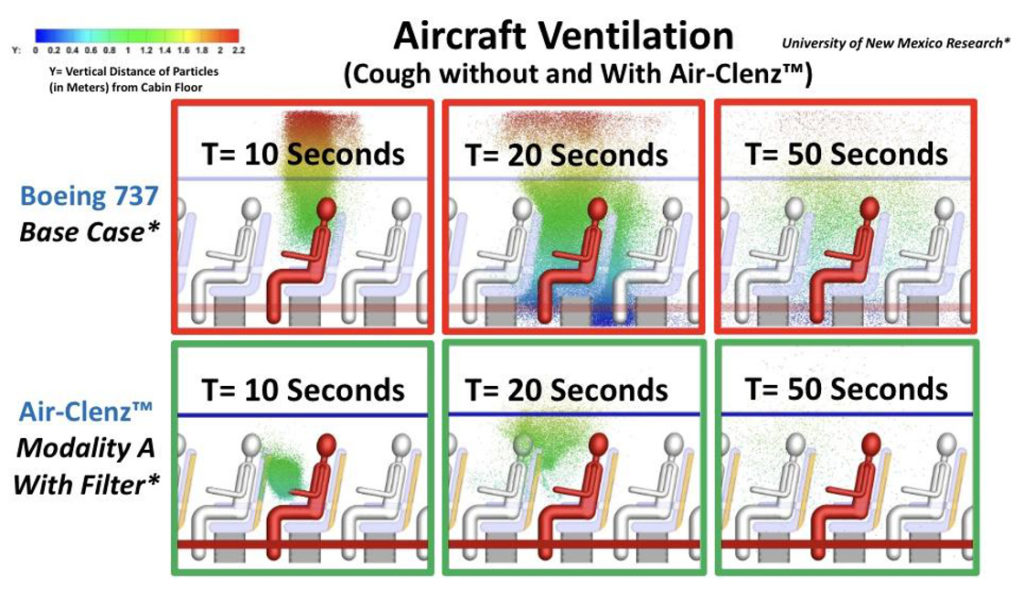University of New Mexico Research Shows That Air-Clenz™ Can Reduce Passenger Cross Infection 50% To 100% Aboard Aircraft
Atlanta, September 12, 2022 – In conjunction with the RedCabin Aircraft Cabin Innovation Summit here this week, Air-Clenz Systems™ (Air-Clenz™) announced today the results of independent research by the University of New Mexico Department of Mechanical Engineering (UNM) on the value of adding Air-Clenz™ technology to passenger seats on a Boeing 737-800. The research showed that Air-Clenz™ can significantly reduce and in some cases stop cross infection among seated passengers compared to the standard HVAC system for that aircraft. The level of reduction ranged between 50% and 100% based on flight duration and the specific infectious airborne pathogen evaluated.
Stuart Sheldon, CEO of Air-Clenz™ explained that “Many Airlines are quick to share that cabin air within their aircraft is changed every 2–3 minutes. Unfortunately, even with the use of excellent HEPA filters and with cabin air changes every 2-3 minutes, it is not nearly quick enough to suppress the spread of highly infectious airborne diseases in the cabin. As an example, we can contract certain variants of COVID within 10 seconds of inhaling a nearby person’s infectious breath, cough, or sneeze. Air-Clenz™ is the only known technology that can quickly stop, capture, and clean a seated passengers’ exhaled breath, cough, or sneeze. In most cases Air-Clenz™ accomplishes this in 10 seconds or less and before the exhaled, infected air spreads throughout the cabin.”
The proprietary Air-Clenz™ approach can be utilized in all types of muti-seated venues, such as buses, trains, automobiles, theaters, classrooms and auditoriums. In addition, Air-Clenz™ has also adapted its technology for use with computer monitors, laptops, and TVs. Air-Clenz™ was granted US patent 11,324,850 in May of 2022 and recently received Notice of Allowance that a second patent will issue soon. Multiple additional patent applications are pending around the world.

Professor Svetlana Poroseva, PhD, UNM research team leader, stated “the UNM computational fluid dynamics-based research on aerosol transport in an aircraft cabin has been ongoing over the last two years. The research model covers a 60-seat coach section of a Boeing 737-800 and assumes that two sick passengers board the aircraft and sit with the other 58 passengers in that section. The study analyzed how 368,000 particles exhaled by sick passengers spread in the air, deposited on the cabin surfaces including the passengers, and inhaled by other passengers during 5 min of a flight in the cruise conditions. UNM first simulated a case (hereafter, the Base Case) with the aircraft’s HEPA ventilation system. After this Base Case evaluation, the team modeled three different modalities utilizing Air-Clenz™ incorporated into the cabin which were then compared to the Base Case simulations.” UNM originally modeled the Base Case in 2020 and published their findings in Physics of Fluids Journal in 2021.

“Once we knew the number of airborne inhaled particles for each of the four modalities, we calculated the number of infected passengers for different infectious airborne viruses and bacteria with different durations of exposure,” said Air-Clenz™ Chief Scientist Anita Broach, PhD. “We considered SARS-Cov-2 (“COVID”), Influenza H1N1 (flu), Rhinovirus RV15 (common cold), Norovirus, Adenovirus type 4, M. tuberculosis, Bordetella pertussis, Bacillus anthracis, M. pneumoniae, etc., and for 1-hour, 2-hour, and 6- hour flights.”
Each of the Air-Clenz™ modalities: Modality A without filter, Modality A with filter, and Modality B effectively reduced the number of newly infected passengers compared to the Base Case. More specifically, Modality A without filter reduced the number of newly infected passengers by 33% -50%, while Modality A with filter reduced the number of 50%-100% of newly infected passengers depending on the infectiousness of the disease and the duration of the flight. Modality B reduced this number by more than 89 % for a maximum of one newly infected passenger for the highly infectious diseases during longer flights. While Modality B gave the lowest number of newly infected passengers, it seems that this modality may be the hardest one to be implemented in modern aircraft. Therefore, Modality A with filter appears to be the ideal balance of easy installation and solid protection provided against cross-infections.
Kevin Karem, PhD – a career virologist, and an Air-Clenz™ Scientific Advisory Board Member -explains the importance of the unique approach, “Stopping a breath, cough, or sneeze before it disperses into indoor room air is a very smart approach to reducing airborne cross infection. Air-Clenz™ stops the forward motion of exhaled air and then quickly captures, cleans, and returns it to the room. This approach appears to have significant promise in reducing the spread of indoor airborne infectious disease.”
Air-Clenz™ will exhibit prototypes of its technology at the 2022 RedCabin Aircraft Cabin Innovation Summit, hosted by Delta Air Lines and attended by many of the best airlines, aircraft manufacturers, original equipment manufacturers, suppliers, and design houses.
About Air-Clenz Systems™
Air-Clenz Systems™ (www.Air-Clenz.com ) based in Atlanta, Georgia, was launched by success-proven inventors, scientists, and collaboration partners attempting to solve major global challenges caused by the coronavirus pandemic, with an eye to benefiting the global population at large.
Air-Clenz Systems™ proprietary technology and approach is directed at the quick capture and cleaning of airborne particles from exhaled air before they can disperse within an indoor room and be transmitted to others. The technology can be adapted to work in most indoor venues where individuals are seated, including schools, offices, houses of worship, learning institutions, theaters, and vehicles of all types, including aircraft.
Contact:
Stu Sheldon, President Air-Clenz Systems
404-754-4004/ Stu@Air-Clenz.com
